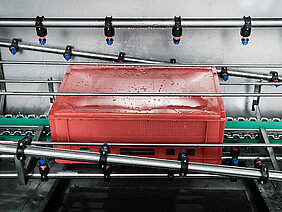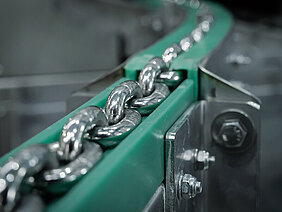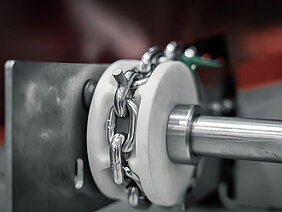The premium-quality and corrosion-resistant cromox® stainless steel chains have successfully proven and established themselves in this sector for decades now.
This is also confirmed by GDI Intralogistics GmbH, a company specializing in washing, conveying, storage, and automation technology for reusable containers in the food industry: they have been using cromox® stainless steel chains of material grade 1.4404 (AISI 316 L) in their washing plants for reusable crates for many years already.
In the first step of the washing process, the containers will be roughly cleaned with water, then grease, protein, and other residues will be removed in a caustic zone at a temperature of up to 45 °C, and after that, the containers will be rinsed with clear water. Subsequently, the reusable containers will either be disinfected or sterilized, depending on the requirements and intended use: for this application, the accumulated process water will be recirculated and filtered – for hot water sterilization, on the other hand, fresh water at a temperature of over 90 °C will be supplied.
Crevice and pitting corrosion due to moisture and heat
The chains employed for container transport have to satisfy the most stringent requirements, as they are subjected to extreme conditions. Even if the use of water and cleaning agents is reduced in the cleaning process – to the extent admissible under applicable hygiene regulations –, moisture in connection with high temperatures, in particular, may still provoke crevice and pitting corrosion. The resulting consequences are tensile load reduction, defects and/or also released rust particles which will re-contaminate the containers. For this reason, Ketten Wälder GmbH from Bad Endorf, Germany, a globally operating company specializing in innovative chain technology, only uses stainless steels of the material grades 1.4404 (AISI 316 L) or 1.4462 (AISI 318 LN) for the production of their chains. These steels feature optimum chemical resistance and favourable mechanical properties. The high chromium content in the alloys, in combination with nickel and molybdenum, provides the best possible resistance to corrosion or acids – even 10 % sulfuric acid at a temperature of 20 °C will reveal only minimal surface corrosion, whereas 50 % acetic or tartaric acid at the same temperature will reveal no surface corrosion at all.
1.4404 (AISI 316 L) stainless steel meeting highest EN 818 requirements
Grade 1.4404 (AISI 316 L) stainless steel exhibits a strength of 500 to 700 N/mm² and a breaking force of 62 kN at a diameter of 8 mm. In the more robust 1.4462 (AISI 318 LN) duplex steel, the nickel content is reduced and, instead, nitrogen is added as an additional austenite former*. Its tensile strength ranges between 650 and 880 MPa, and its breaking load at the same diameter is above 66 kN. In general, cromox® chains are classified Grade 60 – now also Grade 80 –, as well as safety factor of 1:2, and thus fulfilling the highest requirements of the applicable DIN EN 818 standard.
In order to achieve a maximum level of quality and load-bearing capacity/resilience, the steel is processed with the greatest expertise and according to state-of-the-art technological standards at the Ketten Wälder GmbH production facility. To this end, the individual chain links are welded with high precision to produce uniform surfaces without any cavities which may offer potential entry points for contamination or pitting corrosion.
The ensuing calibration process – in the course of which each individual chain link is tested 100% for its load-bearing capacity and quality – will safeguard that the manufactured chain shows no flaws or deficiencies whatsoever. Random test procedures, involving the application of load tests above the maximum level, reliably ensure that the chain links do not break at their welding seams.
Facilitated cleaning due to special surface treatment
Depending on the intended use or application, the material will also be subjected to a special treatment (surface finishing). In the food industry, this usually is electropolishing**: The originally matt and rough metallic surface will be transformed into a more homogeneous and shinier, metallically pure surface by means of electrochemical polishing. With the thus refined, polished surface, the chain not only runs smoothly over the pulleys, but also – owing to the fact that neither contamination nor production residues have been deposited to any significant extent – facilitates the cleaning measures required in this particular hygiene area, and renders them both more efficient and more economical.
Wherever cleanliness is required, cromox® chains are virtually irreplaceable, emphasizes Carlo Weber, sales manager of lifting equipment manufacturer Kurschildgen GmbH. He also values their high-quality properties, especially for hygiene-critical or hygiene-sensitive production areas. The company uses and integrates the high-alloy*** INOX**** chains as chain slings for load suspension in food and chemical production areas as well as for applications in clean rooms among others. Conventional, non-stainless chains, which may have been coated to prevent corrosion, are prone to particle detachment and, as a consequence, to environmental/product contamination. Grade 1.4404 (AISI 316 L) stainless steel is corrosion resistant even without coating and, therefore, entails no risk of contamination. Even aggressive cleaning agents frequently used in these industries, which cause corrosion of conventional steel, will leave cromox® 1.4404 (AISI 316 L) stainless steel chains entirely unscathed.
Innovative. Progressive. Customer-focused. Made in Germany.
Innovative ideas + ongoing new developments + customer centricity at its best: Ketten Wälder GmbH offers a wide range of products and components for use in production and processing environments, including cleanrooms and clean areas. The cromox® catalog of Ketten Wälder GmbH, presents the company′s comprehensive portfolio of high-quality stainless steel products and, additionally, provides a more detailed explanation of customized special designs/constructions in a separate section. Please click here for further information on the product range ″Stainless steel chains for industrial applications″.
* elements such as nickel (Ni), cobalt (Co), carbon (C), manganese (Mn), and nitrogen (N)
** The advantages of electropolishing are smooth and shiny surfaces, metallic purity, optimum cleaning properties, particle freedom, a significantly reduced deposit/coating tendency, a substantially reduced outgassing behaviour, high corrosion resistance, and reduced friction, resulting in only slightest wear.
*** High-alloy steels are steels whose mass content of at least one alloying element exceeds 5%.
**** stainless steel or INOX, from French ″inoxydable″, in English ″inoxydable″ or ″non-corrosive″





